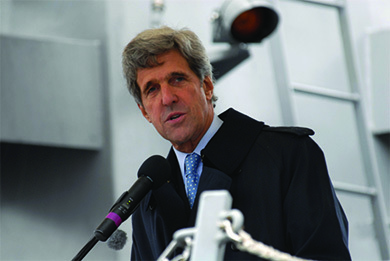| << Chapter < Page | Chapter >> Page > |
In March 2004, an ambush by Iraqi insurgents of a convoy of private military contractors from Blackwater USA in the town of Fallujah west of Baghdad, and the subsequent torture and mutilation of the four captured mercenaries, shocked the American public. But the event also highlighted the growing insurgency against U.S. occupation, the escalating sectarian conflict between the newly empowered Shia Muslims and the minority of the formerly ruling Sunni, and the escalating costs of a war involving a large number of private contractors that, by conservative estimates, approached $1.7 trillion by 2013. Just as importantly, the American campaign in Iraq had diverted resources from the war against al-Qaeda in Afghanistan, where U.S troops were no closer to capturing Osama bin Laden, the mastermind behind the 9/11 attacks.
With two hot wars overseas, one of which appeared to be spiraling out of control, the Democrats nominated a decorated Vietnam War veteran, Massachusetts senator John Kerry ( [link] ), to challenge Bush for the presidency. As someone with combat experience, three Purple Hearts, and a foreign policy background, Kerry seemed like the right challenger in a time of war. But his record of support for the invasion of Iraq made his criticism of the incumbent less compelling and earned him the byname “Waffler” from Republicans. The Bush campaign also sought to characterize Kerry as an elitist out of touch with regular Americans—Kerry had studied overseas, spoke fluent French, and married a wealthy foreign-born heiress. Republican supporters also unleashed an attack on Kerry’s Vietnam War record, falsely claiming he had lied about his experience and fraudulently received his medals. Kerry’s reluctance to embrace his past leadership of Vietnam Veterans Against the War weakened the enthusiasm of antiwar Americans while opening him up to criticisms from veterans groups. This combination compromised the impact of his challenge to the incumbent in a time of war.

Urged by the Republican Party to “stay the course” with Bush, voters listened. Bush won another narrow victory, and the Republican Party did well overall, picking up four seats in the Senate and increasing its majority there to fifty-five. In the House, the Republican Party gained three seats, adding to its majority there as well. Across the nation, most governorships also went to Republicans, and Republicans dominated many state legislatures.
Despite a narrow win, the president made a bold declaration in his first news conference following the election. “I earned capital in this campaign, political capital, and now I intend to spend it.” The policies on which he chose to spend this political capital included the partial privatization of Social Security and new limits on court-awarded damages in medical malpractice lawsuits. In foreign affairs, Bush promised that the United States would work towards “ending tyranny in the world.” But at home and abroad, the president achieved few of his second-term goals. Instead, his second term in office became associated with the persistent challenge of pacifying Iraq, the failure of the homeland security apparatus during Hurricane Katrina, and the most severe economic crisis since the Great Depression.

Notification Switch
Would you like to follow the 'U.s. history' conversation and receive update notifications?